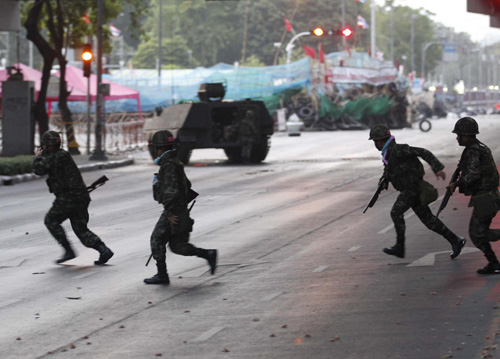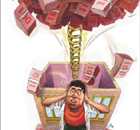Asia-Pacific
Thai army breaks through protest barricades
(Agencies)
Updated: 2010-05-19 10:20
 |
Large Medium Small |
BANGKOK - Thai troops and armoured vehicles broke through barricades of tyres and bamboo on Wednesday in a final offensive to evict thousands of anti-government protesters from their fortified camp in central Bangkok, witnesses said.
 Thai troops and armoured vehicles move on a deserted road at the entrance of the business district during a rally by anti-government "red shirt" protesters in Bangkok May 19, 2010. [Agencies] |
| ||||
Troops fired tear gas and automatic rifles at the red-shirted protesters, as armoured vehicles advanced from the business district through a barricaded intersection and stopped before closing in on an area where an estimated 3,000 demonstrators were rallying and refused to leave.
At least two demonstrators were shot, one in the chest while trying to help a fellow protester. The "red shirts" responded by firing at soldiers, a witness said. A police hospital said at least eight people had been wounded.
Some troops were seen firing from an overpass as army officials blocked journalists from entering the area.
Protesters ignited walls of tyres as the troops arrived, causing thick black smoke to billow high over skyscrapers and camoflauging thousands of demonstrators who have occupied the heart of Bangkok's commercial district for more than six weeks.
Troops earlier used bullhorns and loudspeakers to urge protesters and civilians to leave, as military helicopters circled overhead.
"Please leave the site immediately. Officials are about to conduct an operation," a soldier said over a loudspeaker.
The military offensive came a day after the collapse of a proposal for talks aimed at ending five days of chaotic street fighting that descended into urban warfare, which killed 39 people and wounded more than 300.
"I have no plan to flee," said 54-year-old protester Saman Niyakul from Ubon Ratchathani province as he prepared a homemade rocket to launch at the troops. "I am here here to fight for better Thailand. I don't mind dying for my country."
Tightening Cordon
Leaders called on protesters not to panic and not to break into nearby buildings. "We must not start the violence. We will stay here together and fight together," a protest leader, Nattawut Saikua, said on a stage at the main encampment.
Government spokesman Panitan Wattanayagorn said the aim of the operation was to tighten a security cordon around the encampment, and in "several locations in Bangkok" which would take the rest of the day.
His comments seem to indicate that the military was not yet ready to evict the protesters from the encampment in what many believe would incur heavy casualties on both sides.
The crackdown has raised concerns that it could unleash unrest in other parts of the capital and outside Bangkok.
Two buildings were on fire on the periphery of the protest encampment, a bank and a government building.
The mostly rural and urban poor protestors broadly support former premier Thaksin Shinawatra, a graft-convicted billionaire ousted in a 2006 coup and living in self-imposed exile to avoid jail.
"The protest must end immediately and leaders must surrender and stop the violence," Korbsak Sabhavasau, an advisor to Thailand's prime minister, told Channel 3 television.
Protest leader Nattawut Saikua urged supporters to fight. "But if they come, we will let it happen and fight on from here."
Soon after he spoke, protest leaders broke into songs, as people danced around the protest stage, and in a surreal sight, comedy skits were performed on the stage.
The red shirts accuse the British-born, Oxford-educated Prime Minister Abhisit Vejjajiva of lacking a popular mandate after coming to power in a controversial parliamentary vote in 2008 with tacit backing from the military.
They have demanded immediate elections.
Troops had over the past few days had thrown a cordon around the protest site, a "tent city" at the Rachaprasong intersection, paralysing the heart of Bangkok. Hundreds of women and children have taken refuge in a temple inside the protest area.
Deputy Prime Minister Suthep Thuagsuban has said evicting people from the encampment had to be "a last resort".
Protesters have stockpiled food, water, and supplies in the encampment since Thursday when the assassination of a major-general allied to the red shirts, and an army operation to pressure them, sparked the latest wave of violence that has killed 68 people and wounded more than 1,700 since the demonstrations began in mid-March.
The violence in Bangkok, one of the world's most popular city tourism destinations, has killed nearly 70 people and wounded more than 1,700 since the protests began in mid-March, raising concerns about the stability of the Southeast Asian nation.









